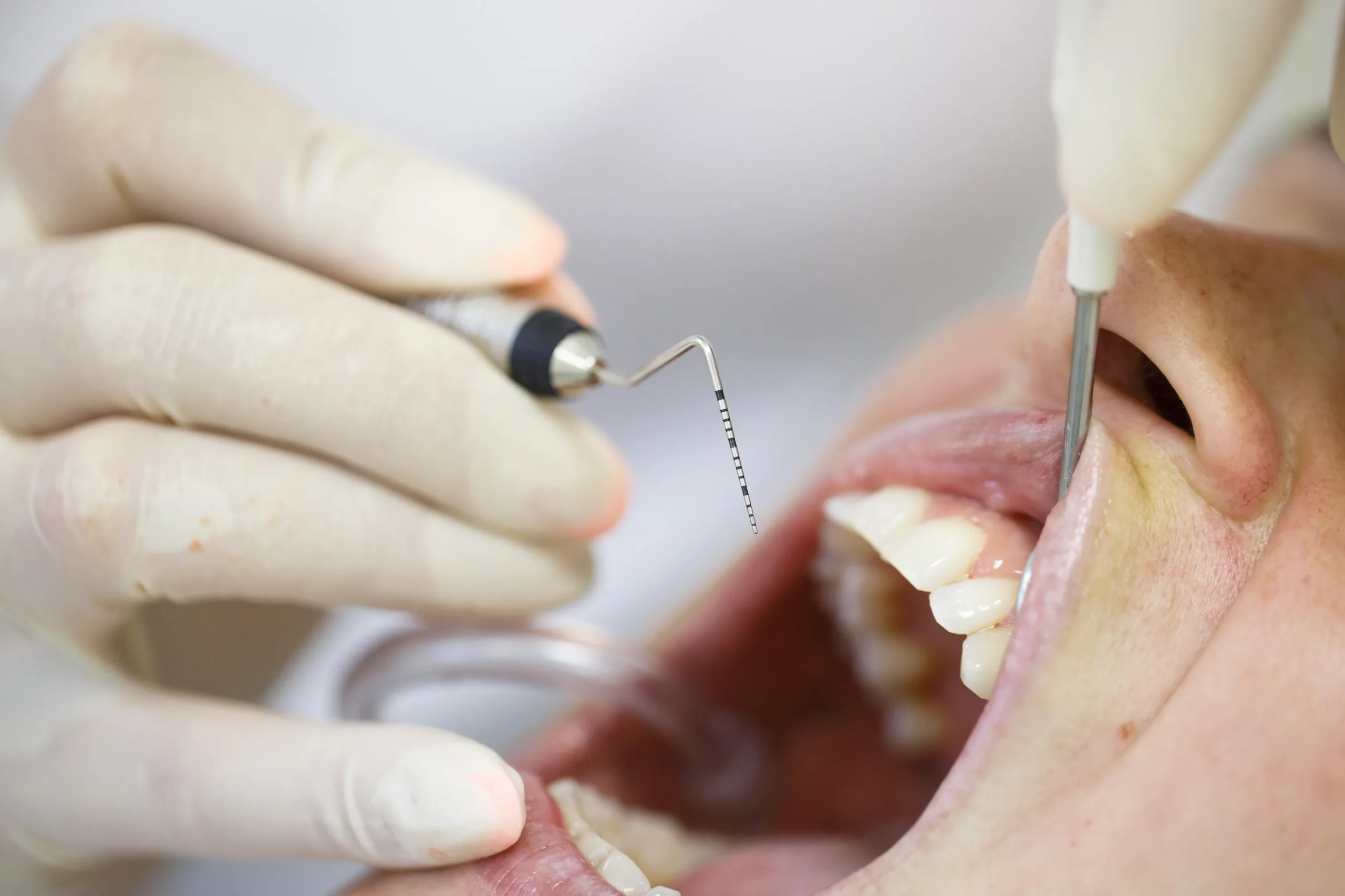
Gum disease affects nearly half of all adults over 30, yet many people remain unaware they have this condition until it reaches advanced stages where tooth loss becomes a real possibility. The silent progression of periodontal disease means that bleeding gums, persistent bad breath, or loose teeth may be signs of serious infection that requires immediate professional intervention to prevent permanent damage to your oral health.
At Maple Glen Modern Dentistry, Dr. Adam Rudin provides comprehensive periodontal therapy designed to eliminate infection, restore gum health, and prevent the progression of disease that could lead to tooth loss as part of our general dentistry services. His thorough approach to periodontal treatment combines advanced techniques with personalized care plans that address your specific needs while helping you maintain optimal gum health for life. Contact us today!

Ready to experience general dentistry that goes beyond the basics? Call us at (267) 603-6463 or contact us online to schedule your comprehensive examination and discover what exceptional general dental care can do for your oral health and overall well-being.

Periodontal disease, commonly known as gum disease, is a bacterial infection that affects the tissues supporting your teeth, including your gums, periodontal ligaments, and jawbone. This progressive condition begins with gingivitis, characterized by red, swollen, bleeding gums, and can advance to periodontitis, where the infection destroys the structures that hold your teeth in place.
The bacteria responsible for periodontal disease form plaque that hardens into tartar below the gum line, creating pockets where more bacteria can accumulate and multiply. As these pockets deepen, the infection spreads, causing gum recession, bone loss, and eventually tooth mobility or loss if left untreated.
Understanding the stages of periodontal disease helps explain why early intervention is so important for preventing permanent damage. While gingivitis is reversible with proper treatment and improved oral hygiene, periodontitis causes irreversible damage that can only be managed, not cured, making prevention and early treatment essential for maintaining your natural teeth.
Certain factors increase your risk of developing periodontal disease, including smoking, diabetes, genetic predisposition, stress, and medications that reduce saliva production. Recognizing these risk factors allows for more aggressive prevention and monitoring to catch problems early.
Warning signs of periodontal disease include persistent bad breath, bleeding gums during brushing or flossing, gum recession, loose teeth, changes in your bite, and pus between teeth and gums. These symptoms should never be ignored, as they indicate active infection that requires professional treatment.

Accurate diagnosis of periodontal disease requires thorough evaluation that goes beyond visual examination to include detailed measurements of gum pocket depths, assessment of bone levels, and evaluation of tooth mobility. This comprehensive approach allows Dr. Rudin to determine the extent of the disease and develop an appropriate treatment plan for your specific situation.
Digital x-rays provide detailed images of bone levels around your teeth, revealing areas where periodontal disease has caused bone loss that may not be visible during clinical examination. This information is essential for treatment planning and monitoring your response to therapy over time.
Periodontal charting documents pocket depths around each tooth, creating a baseline for measuring improvement following treatment. This detailed record-keeping allows us to track your progress and modify treatment as needed to achieve optimal results.
Modern periodontal evaluation may include advanced diagnostic tools that provide additional information about the bacterial composition of your periodontal pockets and your individual risk factors for disease progression. This personalized approach allows for more targeted treatment that addresses your specific needs.

The foundation of periodontal treatment involves thorough cleaning of root surfaces below the gum line to remove bacterial plaque and tartar deposits that cause infection and inflammation. This process, called scaling and root planing, is often the first line of treatment for periodontal disease and can be highly effective when performed thoroughly.
Scaling removes bacterial deposits from the tooth and root surfaces, while root planing smooths rough areas on roots where bacteria tend to accumulate. This deep cleaning allows your gums to heal and reattach to clean root surfaces, reducing pocket depths and eliminating the infection that causes periodontal disease.
The procedure is typically performed using local anesthesia to ensure your comfort throughout the process. Depending on the extent of the disease, treatment may be completed in one appointment or divided into multiple sessions to allow for thorough cleaning of all affected areas.
Following scaling and root planing, antimicrobial medications may be placed directly into periodontal pockets to eliminate remaining bacteria and promote healing. These localized treatments provide high concentrations of medication exactly where it’s needed while minimizing systemic effects.
This comprehensive approach to non-surgical therapy often produces excellent results for patients with mild to moderate periodontal disease. The non-surgical intervention process includes:

Successful periodontal treatment requires ongoing maintenance to prevent disease recurrence and maintain the improvements achieved through therapy. Periodontal maintenance involves more frequent professional cleanings and monitoring than routine preventive care, typically every 3-4 months, depending on your individual needs.
During maintenance appointments, we carefully monitor your gum health, measure pocket depths to ensure they remain stable, and provide thorough cleaning that removes any bacterial accumulation before it can cause problems. This proactive approach helps maintain the results of your initial treatment while preventing disease progression.
Home care plays a crucial role in periodontal maintenance success, and we provide detailed instructions for daily oral hygiene routines that support gum health. This may include specific brushing techniques, interdental cleaning methods, and antimicrobial rinses that help control bacterial growth between professional appointments.
The frequency of your maintenance appointments depends on factors like the severity of your initial disease, your response to treatment, and your ability to maintain effective home care. We customize your maintenance schedule to provide the level of care necessary for maintaining optimal periodontal health.

Some cases of advanced periodontal disease require surgical intervention to access deeply infected areas, regenerate lost bone and tissue, or reshape gum and bone contours for better long-term maintenance, often working in coordination with restorative dentistry procedures.
Surgical periodontal therapy may involve procedures to reduce pocket depths, regenerate lost bone and ligament attachments, or correct aesthetic problems caused by gum recession. Dr. Rudin’s training in comprehensive care includes advanced periodontal techniques and endodontic therapy that can address complex situations requiring surgical intervention.
Modern periodontal surgery includes regenerative techniques that can actually restore some of the bone and ligament attachment lost to periodontal disease. These procedures use specialized materials and techniques to encourage your body’s natural healing processes to rebuild damaged structures.
Gum recession caused by periodontal disease or other factors can be addressed through gum grafting procedures that restore gum tissue coverage while protecting exposed root surfaces. These procedures can improve both function and appearance while reducing sensitivity and preventing further recession.

Research has established clear links between periodontal disease and systemic health conditions including heart disease, diabetes, stroke, and pregnancy complications. The bacteria and inflammation associated with periodontal disease can affect your entire body, making gum health an important component of your overall health and wellbeing.
Patients with diabetes are at increased risk for periodontal disease, while periodontal infection can make blood sugar control more difficult. This bidirectional relationship emphasizes the importance of coordinated care between your dental and medical providers for optimal health outcomes.
Treating periodontal disease can improve your overall health while reducing your risk for certain systemic conditions. This connection makes periodontal therapy an investment in both your oral health and your general wellbeing.
We work closely with your physician and other healthcare providers to ensure your periodontal treatment supports your overall health goals, so contact us to discuss your specific needs. This collaborative approach is particularly important for patients with diabetes, heart disease, or other conditions that may be affected by periodontal health.
